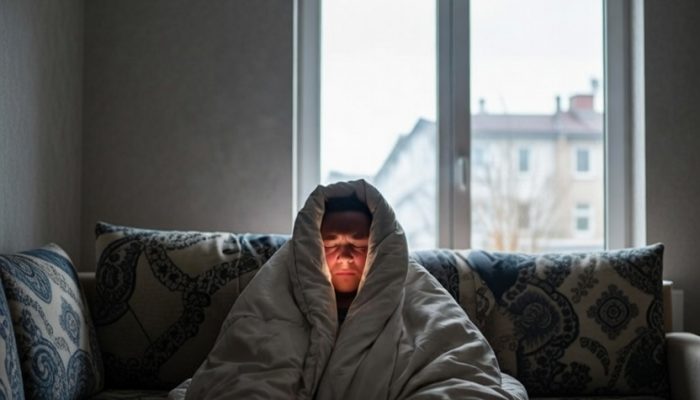Introduction
We spend nearly a third of our lives asleep. Sleep isn’t just a time-out from our busy schedules, it’s a vital process that helps our bodies heal, our minds reset, and our emotions stabilize. And yet, despite its importance, sleep is often one of the most neglected aspects of healthcare.
Over 500 million people worldwide silently suffer from sleep disturbances. Even more surprising? Most don’t even realise it. Whether it’s waking up frequently during the night, feeling tired even after a full night’s rest, or simply struggling to fall asleep, poor sleep quality is a growing issue that affects people of all ages and backgrounds.
A Unique Challenge: Sleep and Light Exposure in Scotland
People living in Scotland, especially in the north, face a unique challenge when it comes to maintaining a healthy sleep rhythm: seasonal extremes in daylight.
Prolonged daylight hours can disrupt the body’s circadian rhythm, the internal clock that regulates sleep and wake cycles, making it harder to fall asleep or stay asleep.
On the flip side, in winter, the days tend to be very short and dark, with limited natural sunlight. This lack of daylight is linked not only to low mood and Seasonal Affective Disorder (SAD), but also to irregular melatonin production, a hormone that helps induce sleep. The result is often sluggishness during the day and difficulty sleeping at night, a frustrating paradox.
These seasonal patterns can lead to:
- Trouble falling asleep despite fatigue
- Poor sleep quality
- Mood disturbances and irritability
- Low energy levels during the day
- Heightened sensitivity to light or darkness

Why Sleep Matters More Than You Think
Sleep is essential for both physical and mental health. During sleep, our bodies repair tissue, balance hormones, and strengthen the immune system. The brain uses this downtime to process information, consolidate memories, and regulate mood.
Research shows that sleep problems are linked to more than 70 medical conditions, including heart disease, diabetes, obesity, depression, anxiety, and even weakened immunity. Long-term sleep deprivation can also increase the risk of accidents, lower productivity, and impair decision-making.
Unfortunately, in our modern world, sleep often takes a backseat to other priorities. Screens, stress, artificial lighting, caffeine, and irregular schedules all contribute to a sleep-deprived society.
The Conventional Approach — And Its Limitations
When people do seek help for sleep problems, the most common solutions offered are prescription sleep medications or over-the-counter aids. While these drugs can provide short-term relief, they often come with a list of side effects: daytime drowsiness, dependence, memory problems, and an increased risk of falls or injury — especially in older adults.
Worse, these medications don’t always address the root cause of the problem. They act like a bandage, helping people fall asleep temporarily without solving the underlying imbalance.
This has led many individuals to explore safer, more natural alternatives such as homeopathy.
Homeopathy and Sleep: A Gentle, Personalised Approach
One of the greatest strengths of homeopathy is its individualised nature. Homeopaths don’t prescribe one-size-fits-all remedies. Instead, they take the time to understand the unique pattern of a person’s sleep problems — including emotional stress, physical symptoms, and lifestyle factors.
For example, two people with insomnia might receive entirely different remedies based on their experiences. One person who lies awake with racing thoughts and anxiety might benefit from Arsenicum album, while another who feels drowsy but can’t fall asleep due to worry about work might be helped by Nux vomica.
Some commonly used homeopathic remedies for sleep include:
- Coffea cruda: For individuals who are overly excited, restless, and can’t turn off their thoughts.
- Nux vomica: For those suffering from sleeplessness due to overwork, stress, or excessive stimulants like caffeine or alcohol.
- Ignatia amara: For people whose sleep problems are linked to grief, emotional upsets, or nervous tension.
- Arsenicum album: For those who wake up frequently and feel anxious, especially around 1–3 AM.
- Lycopodium: For those who feel overwhelmed, have digestive troubles, and experience unrefreshing sleep
- Natrum muriaticum: Helpful for emotional imbalances worsened by seasonal changes, especially for people who feel low or melancholic during long winters.
- Pulsatilla: Suits individuals who are emotionally sensitive and whose sleep is affected by environmental changes, including seasonal light shifts.
These remedies are non-habit forming, gentle, and safe for people of all ages.

Scientific Support and Real-World Results
Several research studies have explored homeopathy’s role in improving sleep.
For example, a 2019 study published in the Journal of Integrative Medicine found that individualised homeopathic treatment improved sleep quality and reduced anxiety levels in patients with chronic insomnia. Other clinical observations suggest that homeopathy can support better sleep when used alongside lifestyle changes and stress management.
Beyond the research, countless anecdotal reports and case studies show how people struggling with insomnia, nightmares, or restless sleep have found relief through homeopathy, often after conventional treatments failed.
A Holistic View of Sleep and Wellness
Homeopathy doesn’t just focus on sleep in isolation. It views sleep disturbances as part of a larger picture, whether that includes unresolved emotions, hormonal imbalances, digestive issues, nervous system overload or seasonal disturbances. By addressing the whole person, it often leads to improvements in other areas of health as well.
Many people who start using homeopathy for sleep also notice better digestion, improved mood, fewer headaches, and increased energy during the day. This holistic benefit makes it especially appealing for those who want to take a more natural, sustainable path to wellness.
Tips for Supporting Sleep Naturally
Whether or not you choose to try homeopathy, there are many natural ways to improve sleep:
- Stick to a routine: Go to bed and wake up at the same time every day — even on weekends.
- Limit screen time: Turn off electronic devices at least an hour before bed to reduce blue light exposure.
- Create a sleep sanctuary: Keep your bedroom cool, dark, and quiet. Use blackout curtains or a white noise machine if needed.
- Avoid stimulants: Reduce intake of caffeine, alcohol, and heavy meals in the evening.
- Relax before bed: Try gentle yoga, meditation, or a warm bath to signal your body it’s time to unwind.
- Seek emotional support: Talk to someone or journal if anxiety or worry keeps you up at night.
Homeopathy can complement these habits, providing targeted support that addresses your unique sleep challenges.
Final Thoughts: Embracing a New Sleep Solution
If you’ve been struggling with poor sleep, you’re not alone, and you don’t have to rely solely on medication. Homeopathy offers a gentle, individualised, and holistic approach that aligns with your body’s natural rhythms.
By working with a qualified homeopath and embracing healthy sleep habits, you can rediscover the deep, restorative rest your body and mind crave. Sleep is not a luxury, it’s a foundation for lifelong health. And with the right support, it’s within your reach.With individualised support and the ability to address both acute and chronic symptoms, homeopathy offers a powerful and natural ally for those facing the double challenge of allergic sinusitis.
Our reading room’s an opportunity to have personal time browsing our shelves full of wisdom.
The Helen Campbell Homeopathy Foundation SCIO is a registered educational charity focused on sharing homeopathy’s fascinating history and wonderful wisdom. We’re here to inform, not prescribe!




